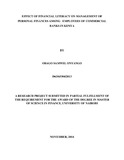Effect of financial literacy on management of personal finances among employees of commercial Banks in Kenya
Abstract
Financial literacy is growing in leaps and bounds in the western world because of the financial intricacies that have increased in the world economy. Africa is not exempted as it is part of the global village. Financial products have increased faster than the knowledge required to acquire these products. The global financial crisis witnessed in 2008/9 testifies to this fact. Fundamentally, lack of financial literacy lured entrants into the mortgages market that in the long run proved costly when interest rates fluctuated to their detriment. The change in the financial scenario put many families in jeopardy and many were declared bankrupt. This research seeks to determine whether financial literacy had any effect on personal financial management practice among employees of commercial banks in Kenya. The population of the study shall comprise all employees perceived to have training in finance matters or gained financial literacy through working experience. These employees are assumed to be financially literate by virtue of their training and nature of work. Purposive sampling was used to select the major banks in Nairobi while simple random sampling technique was used to select 100 respondents from five commercial banks in Nairobi. A self-administered questionnaire was delivered to the respondents and collected after completion. The data was analyzed using the Statistical Packages for social Sciences (SPSS ver 12). The students‟ t-test was used to examine the data with the objective of determining whether there is a significant relationship between financial literacy and personal financial management practices. The data is presented through tables and charts. The findings shows that most respondents participants had financial literacy acquired through training or work experience and that it affects personal financial management among the commercial banks in Kenya. The researcher also sought to establish effects of gender, age, level of education and specialization on personal financial management. The findings conclude that these factors strongly influenced the personal financial management. This could be due to the age distribution of the respondents who were mostly aged between 20-40 years who are considered youthful with relatively low family related financial engagements. The results indicate that majority of the respondents save less proportion of their salaries. This can be attributed to the high cost of living and individual‟s financial discipline. In conclusion, the results indicate that financial literacy has a positive influence on personal financial practices. However, despite the sound financial literacy levels of Commercial banks employees in Kenya, not all the respondents are good managers of their personal finances. As per the findings, though majority of the respondents rated their management of personal finances as excellent and good, substantial cases of poor and very poor scores in management of personal finances have been realized. Based on the research findings, the researcher recommends banks to have various financial literacy training programs to their employees so as to match the financial literacy of the employees to their propensity to save and invest. From the research findings, the government is advised to initiate subsidy programs that will lessen the cost of living and cultivate a culture of savings and investment among its citizen. The study further recommends that individuals should develop a comprehensive saving and investment plans backed by prudent expenditure habits and shrewd management of the borrowings used to finance their investments for optimum returns

